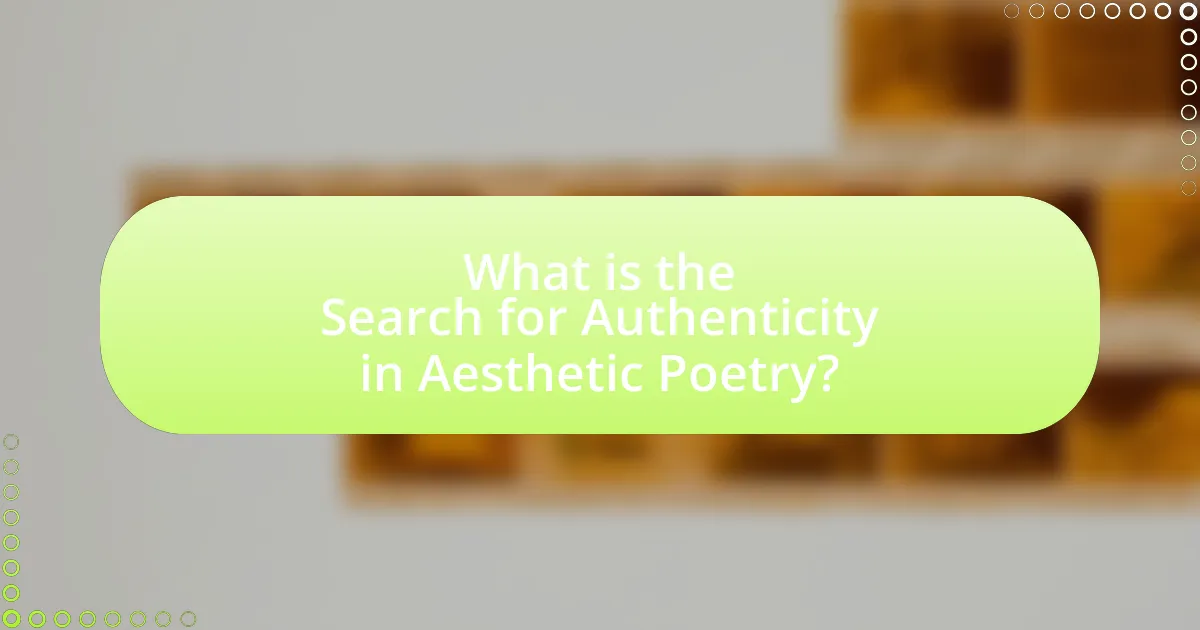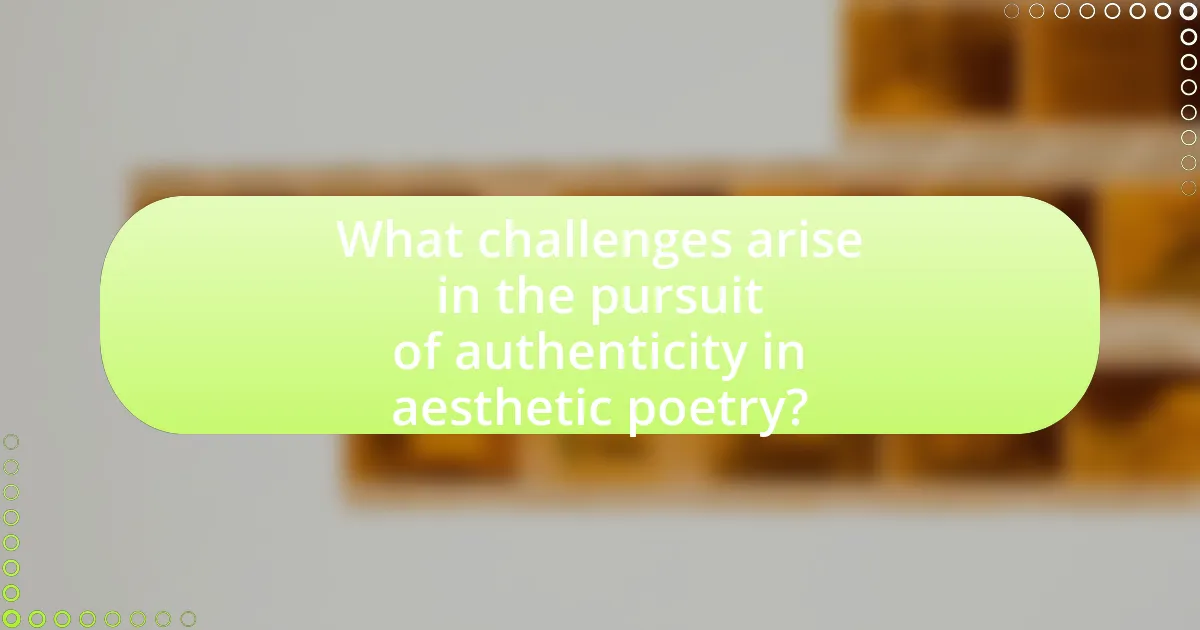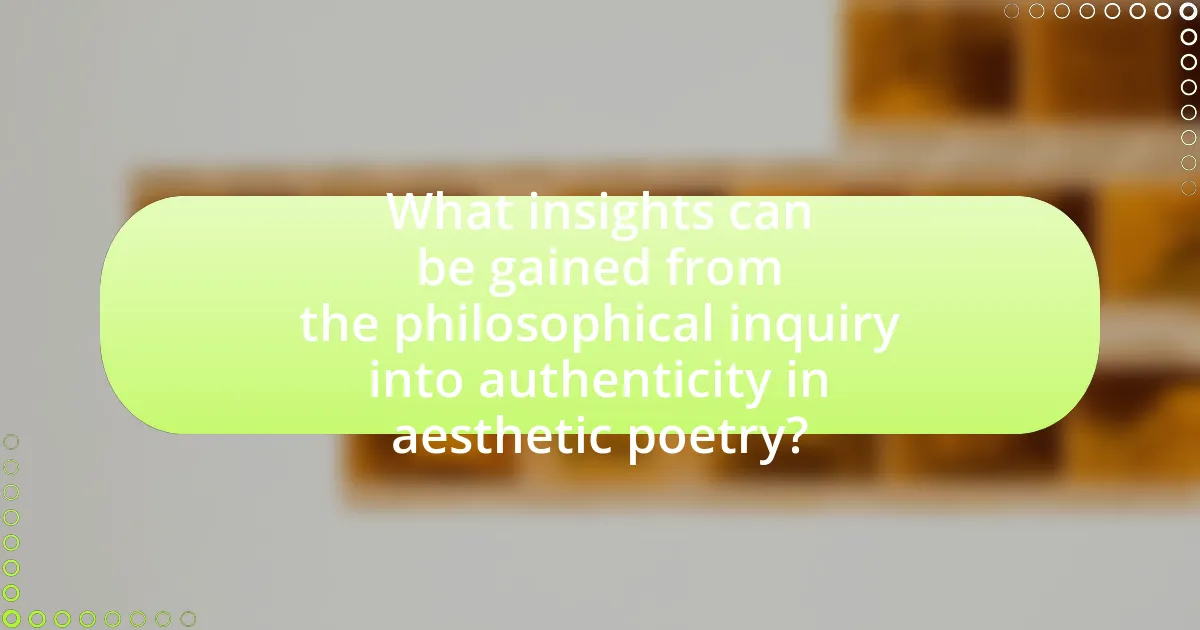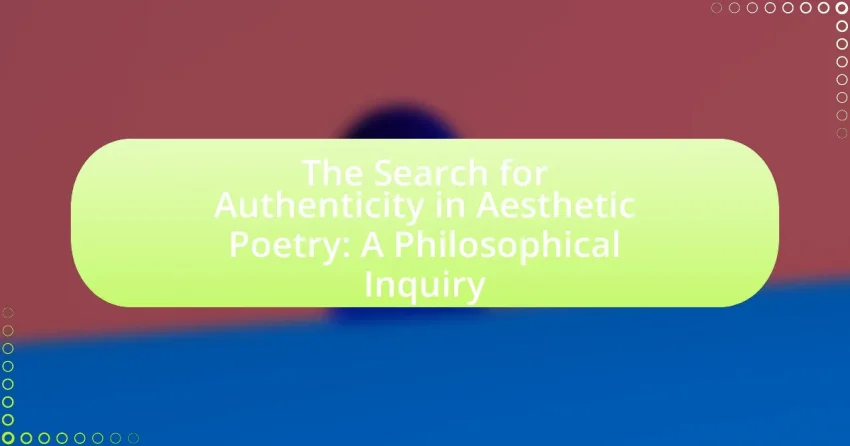The main entity of the article is the exploration of authenticity in aesthetic poetry through a philosophical lens. The article examines the significance of genuine expression and emotional truth in poetry, emphasizing the importance of personal voice and artistic integrity. It discusses various philosophical theories, historical contexts, and literary movements that have shaped the understanding of authenticity, as well as the challenges poets face in balancing personal expression with societal expectations. Additionally, it highlights contemporary approaches to authenticity, including the influence of digital platforms and practical exercises for poets to enhance their authentic voice.

What is the Search for Authenticity in Aesthetic Poetry?
The search for authenticity in aesthetic poetry involves the quest for genuine expression and emotional truth within poetic forms. This pursuit emphasizes the importance of personal voice and the integrity of artistic representation, often contrasting with conventional or formulaic approaches to poetry. Authenticity in this context is validated by the poet’s ability to convey profound experiences and insights that resonate with readers, fostering a deeper connection to the human condition. This notion is supported by literary critiques that highlight the significance of originality and emotional depth as essential components of impactful poetry.
Why is authenticity important in aesthetic poetry?
Authenticity is important in aesthetic poetry because it fosters genuine emotional connections between the poet and the audience. When poets express their true selves and experiences, their work resonates more deeply, allowing readers to engage with the emotions and themes presented. Research indicates that authentic expression in poetry enhances its impact, as seen in studies that show audiences respond more positively to works perceived as sincere. This connection is crucial in aesthetic poetry, where the beauty of language and imagery is often intertwined with the poet’s personal truth.
What philosophical theories support the concept of authenticity in poetry?
Philosophical theories that support the concept of authenticity in poetry include existentialism, phenomenology, and romanticism. Existentialism emphasizes individual experience and the authenticity of personal expression, as seen in the works of philosophers like Jean-Paul Sartre, who argued that true authenticity arises from self-definition and personal choice. Phenomenology, particularly through the ideas of Edmund Husserl and Maurice Merleau-Ponty, focuses on the lived experience and the importance of perception in understanding art, suggesting that authentic poetry emerges from genuine engagement with one’s experiences. Romanticism, with figures like Friedrich Schiller and William Wordsworth, champions the idea that authentic poetry reflects the inner emotional truth of the poet, valuing personal feelings and the sublime connection to nature. These theories collectively underscore the significance of personal truth and subjective experience in the creation and interpretation of authentic poetry.
How does the notion of authenticity influence poetic expression?
The notion of authenticity significantly influences poetic expression by encouraging poets to convey genuine emotions and experiences, which enhances the emotional resonance of their work. Authenticity compels poets to draw from personal truths and lived experiences, fostering a deeper connection with their audience. For instance, the confessional poetry movement, exemplified by poets like Sylvia Plath and Anne Sexton, illustrates how personal authenticity can lead to powerful and relatable expressions of vulnerability and identity. This emphasis on authenticity not only shapes the content of poetry but also affects its form, as poets often experiment with language and structure to reflect their unique voices and perspectives.
What are the historical contexts of authenticity in poetry?
The historical contexts of authenticity in poetry encompass various movements and philosophies that have shaped the understanding of genuine expression. In the Romantic period, poets like Wordsworth and Coleridge emphasized personal emotion and individual experience as markers of authenticity, reacting against the formalism of previous eras. The Modernist movement further explored authenticity by questioning traditional forms and embracing fragmented narratives, as seen in the works of T.S. Eliot and Ezra Pound, who sought to reflect the complexities of contemporary life. Additionally, the rise of confessional poetry in the mid-20th century, exemplified by poets like Sylvia Plath and Robert Lowell, highlighted personal trauma and introspection as essential to authentic poetic voice. These historical contexts illustrate how the concept of authenticity in poetry has evolved, influenced by cultural, social, and philosophical shifts throughout time.
How have different literary movements approached authenticity?
Different literary movements have approached authenticity in varied ways, reflecting their unique philosophies and cultural contexts. For instance, Romanticism emphasized personal experience and emotional truth, valuing the individual’s subjective perspective as a pathway to authenticity. In contrast, Realism sought to depict life accurately and objectively, prioritizing factual representation over emotional expression to convey authenticity. Modernism, on the other hand, challenged traditional notions of authenticity by exploring fragmented narratives and subjective realities, suggesting that authenticity is complex and multifaceted. Postmodernism further deconstructed the idea of authenticity, arguing that it is constructed through language and cultural narratives, thus questioning the very possibility of a singular, objective truth. Each movement’s approach to authenticity reveals its underlying values and the evolving nature of truth in literature.
What role do cultural influences play in defining authenticity in poetry?
Cultural influences play a crucial role in defining authenticity in poetry by shaping the themes, language, and perspectives that poets express. These influences stem from historical contexts, societal norms, and collective experiences that inform a poet’s voice and subject matter. For instance, poets often draw upon cultural narratives and symbols that resonate with their communities, which can enhance the perceived authenticity of their work. Research indicates that poetry that reflects cultural identity and heritage tends to be viewed as more genuine, as seen in the works of poets like Langston Hughes, who infused African American cultural experiences into his poetry, thereby establishing a strong sense of authenticity rooted in his cultural background.
How do poets seek authenticity in their work?
Poets seek authenticity in their work by expressing genuine emotions and experiences that resonate with their true selves. This pursuit often involves introspection, where poets reflect on their personal histories, cultural backgrounds, and societal influences to create relatable and honest narratives. For instance, the confessional poetry movement, exemplified by poets like Sylvia Plath and Anne Sexton, emphasizes personal trauma and emotional honesty, showcasing how vulnerability can lead to authentic expression. Additionally, poets may employ specific language, imagery, and form that align with their unique voice, further enhancing the authenticity of their work.
What techniques do poets use to convey authenticity?
Poets convey authenticity through techniques such as personal voice, vivid imagery, and emotional honesty. Personal voice allows poets to express their unique perspectives and experiences, making their work relatable and genuine. Vivid imagery engages the reader’s senses, creating a tangible connection to the poem’s themes and emotions. Emotional honesty involves the candid expression of feelings, which fosters trust and resonance with the audience. These techniques are supported by the notion that authenticity in poetry often stems from the poet’s ability to reflect their true self and experiences, as highlighted in literary analyses that emphasize the importance of personal narrative in effective poetry.
How does personal experience shape a poet’s quest for authenticity?
Personal experience profoundly shapes a poet’s quest for authenticity by providing the emotional and contextual foundation from which their work emerges. This foundation allows poets to draw upon their unique life events, emotions, and perspectives, which infuse their poetry with genuine sentiment and relatability. For instance, poets like Sylvia Plath and Langston Hughes have often reflected their personal struggles and societal observations in their works, creating a deep connection with readers. Such authenticity is crucial in poetry, as it fosters a sense of trust and resonance between the poet and the audience, ultimately enhancing the impact of the poetic expression.

What challenges arise in the pursuit of authenticity in aesthetic poetry?
The pursuit of authenticity in aesthetic poetry faces several challenges, primarily the tension between personal expression and societal expectations. Poets often grapple with the pressure to conform to established norms or trends, which can dilute their genuine voice. Additionally, the subjective nature of authenticity complicates its definition; what one poet considers authentic may differ significantly from another’s perspective. This variability can lead to self-doubt and inconsistency in a poet’s work. Furthermore, the commercialization of poetry can create a conflict between artistic integrity and marketability, forcing poets to compromise their authentic vision for broader appeal. These challenges highlight the complex interplay between individual creativity and external influences in the realm of aesthetic poetry.
What are the common criticisms of authenticity in poetry?
Common criticisms of authenticity in poetry include the notion that it can be overly subjective, leading to debates about what constitutes genuine expression. Critics argue that authenticity often relies on personal experience, which may not resonate universally, thus limiting its accessibility. Additionally, some contend that the emphasis on authenticity can lead to exclusionary practices, where certain voices or styles are deemed more “authentic” than others, creating a hierarchy within poetic expression. This perspective is supported by literary theorists who highlight the tension between individual experience and collective understanding in poetry, suggesting that the quest for authenticity may inadvertently marginalize diverse poetic forms and voices.
How do societal expectations impact a poet’s authenticity?
Societal expectations significantly impact a poet’s authenticity by imposing constraints on their creative expression. These expectations can lead poets to conform to popular themes, styles, or messages that resonate with societal norms, potentially diluting their unique voice. For instance, poets may feel pressured to address social issues or adopt specific cultural narratives to gain acceptance or recognition, which can compromise their genuine artistic intent. Historical examples include the Romantic poets, who often faced societal pressures to align their work with prevailing ideals of beauty and emotion, thus shaping their authenticity in the process.
What dilemmas do poets face when balancing authenticity and audience reception?
Poets face the dilemma of expressing their true selves while also considering the expectations and preferences of their audience. This tension arises because authenticity often involves personal experiences and emotions that may not resonate with a broader audience, potentially leading to a disconnect. For instance, a poet may choose to write about intimate or controversial subjects that reflect their genuine voice but risk alienating readers who prefer more conventional themes. Additionally, the pressure to achieve commercial success can compel poets to alter their style or content to align with popular trends, which may compromise their artistic integrity. This balancing act is evident in the works of poets like Sylvia Plath and Allen Ginsberg, who navigated personal authenticity while addressing societal issues, illustrating the complex interplay between individual expression and audience reception.
How do contemporary poets navigate the search for authenticity?
Contemporary poets navigate the search for authenticity by embracing personal experiences and diverse voices, often reflecting on their identities and societal contexts. They utilize innovative forms and styles to convey genuine emotions and thoughts, which allows them to connect with readers on a deeper level. For instance, poets like Ocean Vuong and Claudia Rankine incorporate elements of their cultural backgrounds and lived experiences, demonstrating how authenticity can be expressed through unique narrative perspectives. This approach not only challenges traditional poetic conventions but also resonates with contemporary audiences seeking relatable and honest expressions of the human experience.
What innovations have emerged in modern poetry regarding authenticity?
Innovations in modern poetry regarding authenticity include the use of diverse voices, multimedia integration, and the exploration of personal and collective identities. These innovations reflect a shift towards inclusivity and the breaking of traditional boundaries in poetic expression. For instance, poets increasingly incorporate spoken word, visual art, and digital platforms to enhance the authenticity of their narratives, allowing for a more genuine representation of varied experiences. This trend is supported by the rise of social media, which has democratized poetry and enabled marginalized voices to share their stories, thus enriching the authenticity of the poetic landscape.
How do digital platforms influence the authenticity of poetic works?
Digital platforms influence the authenticity of poetic works by altering the way poetry is created, shared, and perceived. These platforms enable poets to reach wider audiences and receive immediate feedback, which can lead to a shift in their creative processes and the themes they explore. For instance, the rise of social media has encouraged poets to adapt their styles to fit the preferences of online audiences, potentially compromising their original artistic intentions. Research by the Pew Research Center indicates that 69% of adults in the U.S. use social media, highlighting its significant role in shaping cultural trends, including poetry. Consequently, the interaction between poets and their audiences on these platforms can dilute the authenticity of poetic expression, as poets may prioritize popularity over personal truth.

What insights can be gained from the philosophical inquiry into authenticity in aesthetic poetry?
Philosophical inquiry into authenticity in aesthetic poetry reveals that authenticity is a multifaceted concept encompassing the genuine expression of the poet’s voice, the integrity of the artistic process, and the relationship between the poet and the audience. This inquiry emphasizes that authenticity is not merely about the poet’s intentions but also involves the cultural and historical contexts that shape poetic expression. For instance, the works of poets like John Keats and Emily Dickinson illustrate how personal experiences and societal influences contribute to the authenticity of their poetry. Furthermore, this exploration highlights the tension between subjective interpretation and objective standards of authenticity, suggesting that the appreciation of aesthetic poetry is deeply rooted in both individual perception and collective cultural values.
How does the philosophical inquiry enhance our understanding of poetry?
Philosophical inquiry enhances our understanding of poetry by providing a framework for exploring the deeper meanings and implications of poetic expressions. This exploration allows readers to engage with the fundamental questions of existence, identity, and emotion that poetry often encapsulates. For instance, philosophers like Friedrich Nietzsche and Martin Heidegger have examined the relationship between art and truth, suggesting that poetry can reveal insights about the human condition that transcend mere aesthetic appreciation. Such inquiries encourage a critical analysis of the themes, structures, and language used in poetry, leading to a richer interpretation and appreciation of the art form.
What key philosophical questions arise from the search for authenticity?
Key philosophical questions that arise from the search for authenticity include: What constitutes true selfhood? How do societal norms influence individual authenticity? Can authenticity exist in a mediated or commercialized context? These questions challenge the understanding of identity, the role of culture, and the impact of external influences on personal expression. For instance, existentialist philosophers like Jean-Paul Sartre argue that authenticity is tied to individual freedom and responsibility, suggesting that societal pressures can distort one’s true self. Additionally, the concept of authenticity is often debated in relation to art and aesthetics, questioning whether genuine expression can be achieved in a world saturated with imitation and commercialization.
How can philosophical perspectives inform the interpretation of poetic works?
Philosophical perspectives can significantly inform the interpretation of poetic works by providing frameworks that explore the nature of existence, meaning, and aesthetics. For instance, existentialism, as articulated by philosophers like Jean-Paul Sartre, emphasizes individual experience and authenticity, which can lead readers to interpret poetry as a reflection of personal identity and subjective truth. Additionally, the philosophy of aesthetics, particularly the ideas of Immanuel Kant, suggests that beauty and artistic value are rooted in the viewer’s perception, guiding interpretations towards the emotional and sensory experiences evoked by the poem. These philosophical lenses enable deeper engagement with the text, allowing readers to uncover layers of meaning that align with broader existential and aesthetic inquiries.
What practical approaches can poets adopt to enhance authenticity in their writing?
Poets can enhance authenticity in their writing by engaging in self-reflection and drawing from personal experiences. This approach allows poets to create work that resonates with their true emotions and perspectives, fostering a genuine connection with their audience. Research indicates that writing about personal experiences can lead to greater emotional clarity and authenticity in creative expression, as highlighted in studies on expressive writing by James Pennebaker, which demonstrate that personal narrative enhances emotional processing and authenticity. By prioritizing their unique voice and lived experiences, poets can produce more authentic and impactful poetry.
What exercises can help poets explore their authentic voice?
Poets can explore their authentic voice through exercises such as free writing, voice journaling, and reading diverse poetry. Free writing encourages spontaneous expression without self-censorship, allowing poets to tap into their subconscious thoughts and feelings. Voice journaling involves recording thoughts and emotions in a personal space, which helps in identifying unique patterns and themes in their writing. Reading diverse poetry exposes poets to various styles and perspectives, fostering inspiration and helping them discern their own voice amidst different influences. These exercises are effective because they promote self-discovery and creative freedom, essential components in the journey toward authenticity in poetry.
How can poets critically assess their work for authenticity?
Poets can critically assess their work for authenticity by engaging in self-reflection and seeking feedback from trusted peers. Self-reflection allows poets to evaluate their emotional intentions and the sincerity of their expression, ensuring that their voice remains true to their experiences. Feedback from peers provides an external perspective, highlighting areas where the poet’s voice may align or diverge from their authentic self. Research indicates that peer review can enhance the authenticity of creative work by fostering a supportive environment for honest critique, as noted in studies on collaborative creativity.
